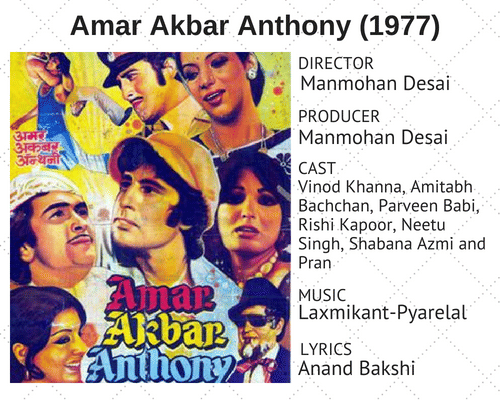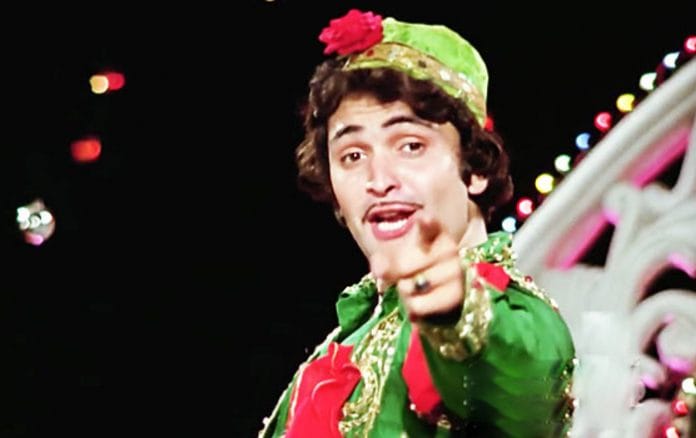Rishi Kapoor’s Murad in Mulk is a four-decade-old version of the Akbar that he played in the 1977 multi-starrer minus the lightness.
It’s not a stretch by any measure to suggest that Rishi Kapoor’s Murad Ali Mohammed in Mulk is probably a 41-year-later version of Akbar Illahabadi, the character he played in the 1977 multi-starrer Amar Akbar Anthony.
In Anubhav Sinha’s release last week, Kapoor plays a Muslim lawyer from Varanasi whose kin get entangled in a terrorism case. In the face of challenges from a system, Murad doesn’t lose hope but fights because of his belief in, and love for, his country.
 Scene by scene, his life’s matrix involving friends from other communities, predominantly Hindus, is scrutinised under the lens of the politics of the day. And he manages to retain his dignity, at immense cost.
Scene by scene, his life’s matrix involving friends from other communities, predominantly Hindus, is scrutinised under the lens of the politics of the day. And he manages to retain his dignity, at immense cost.
Akbar may have grown to become Murad, but he doesn’t get to be all that light and free as before.
It’s almost bizarre, then, to think of how perfectly Manmohan Desai’s golden-jubilee crowd-pleaser may serve as a thematic (light) prequel to Mulk.
Also read: Finally, Bollywood has courage to look at Muslims as regular Indians & not terrorists
The blockbuster success of Amar Akbar Anthony may imply that it was a deliberately designed film, in the tradition of earlier ‘nation-building themes’, but its treatment completely belied any such possible intention. Unlike Mulk, which is more reactionary. In that sense, the two reflect not just very different filmmaking philosophies but also political understanding and compulsions.
In 1977, Desai had three films running in theatres simultaneously – Chacha Bhatija, Dharam Veer and Amar Akbar Anthony. The audience of today may find it ridiculous that all three (and later Parvarish) were based on a lost-and-found plot, which Desai almost patented. The three films had at least one more commonality – actor Jeevan.
Here, Jeevan plays the villain Robert, a popular name for unfriendly characters at the time. He is the root of all problems in chauffer Kishenlal’s (Pran) life. In a turn of events, too hard to believe or describe, Kishenlal loses his wife and three young sons, all of whom are then raised by people from different faiths. So the eldest Amar (Vinod Khanna) is raised by a Hindu policeman; Anthony (Amitabh Bachchan) is raised by a Christian priest; and Akbar, the youngest, is raised by a Muslim tailor.
Ticking all the boxes for a commercial potboiler from the era, the three get their own tracks —with lead pairs, songs, dance, comedy and action.
Also read: Try watching ‘Satyakam’ in the age of post-truth, fake news and incorruptible leaders
Bachchan was the reigning star of the time, with a fairly successful pairing with Parveen Babi. Khanna was a contender for Bachchan’s throne. In that melee, Kapoor, who was a successful but limited romantic hero up till then, ran the risk of being completely overshadowed even though real-life partner Singh featured opposite him.
As the Muslim tailor in love with a doctor, Kapoor played to the gallery (not that he had many options in a Desai film). Through all the conventional stereotypes, from costumes to dialogue to songs, Desai ensured that the religious identity of Akbar (and all the other characters) was front and centre, even when the intended theme was oneness.
But Kapoor’s Akbar benefits from the lightness of Desai’s material, which in turn makes his character more appealing and memorable. He even gets three of the best songs from Laxmikant Pyarelal and Anand Bakshi’s chartbuster album – Taiyab Ali Pyaar Ka Dushman, Pardah Hai Pardah and Shirdi Wale Sai Baba.
https://youtu.be/XjRgw1naMsc
So, the simple, lovable Muslim, who wears his heart on his sleeves, gets to sing a qawwali to impress his girl, taunt his father-in-law, as well as a paean to Sai Baba (a Mohammed Rafi song popular among devotees till date). With his two brothers, he gets to flaunt the idea of religious pluralism, and harmony in differences.
There is a lot of online talk these days about appropriate film credits. In Amar Akbar Anthony, the absurdly hilarious opening credit roll, played over the now-mythological blood donation scene encapsulating the film, is one to remember forever.
The story is credited to J.M. Desai while the ‘story idea’ is in the name of Pushp Raj Sharma. The screenplay is credited to Prayag Raj while ‘scenario’ is by K.K. Shukla. And if these four are not enough, then there is also the dialogue credit to Kader Khan, who sadly has vanished into oblivion in the last two decades.
Reams have been written about the message the film propagates, so much so that for a ‘70s film even the wiki page carries scholarly references. But Desai, who dressed his lead actors in (unbelievable) skirts in Dharam Veer, was far more interested in the idea of a big multi-starrer than a multi-cultural unison. He was making films in times that were far more benign; there was little to no pressure on a filmmaker to be overtly political. Sinha, on the other hand, has explicitly called his film a ‘love story between Hindus and Muslims’.
Also read: ‘Mulk’ is latest in Bollywood series on ‘patriotism trial’ films about Indian Muslims
In a mainstream Hindi film, having a voice is difficult. Sinha, who made at least half a dozen films before Mulk, will attest to this. Desai’s voice was entertainment. But with all the permutations and combinations he applied to create a successful commercial venture, he still ended up making India’s most successful ‘secular’ film. Mulk, obviously, can’t garner that kind of popularity for multiple reasons – one being the relentless ‘Us vs Them’ narrative.
And that’s perhaps where the story lies.






